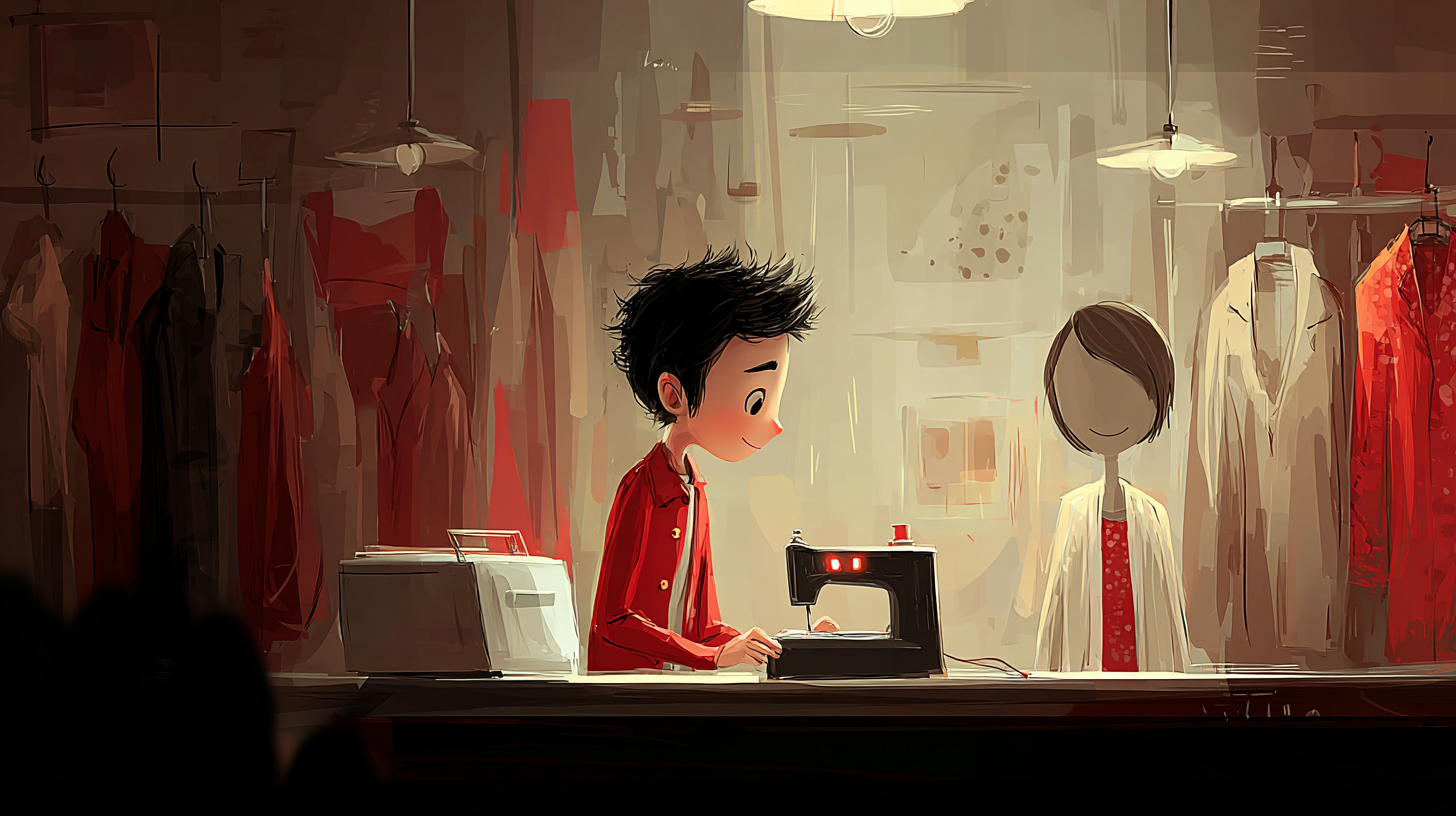A button is a small thing you press or use to close clothes.
「button」は服をとめる小さなものや、機械を動かすスイッチのこと。
以下は英単語 “button” に関するストーリー型学習コンテンツです。まずは大枠の意味を理解して最後の文章で確認しましょう。
主な意味(main meaning)
| 品詞 | 発音記号 (IPA) | 意味 | 例文 |
|---|---|---|---|
| 名詞 (noun) | /ˈbʌtən/ | 服や機械をとめたり動かしたりするための小さな部品(ボタン) | She pressed the button to start the machine. |
| 動詞 (verb) | /ˈbʌtən/ | ボタンで留める | He buttoned his shirt before leaving. |
語源(etymology)
「button」は古フランス語 bouton(芽、突起)から来ていて、「小さな突起」のイメージが基本。そこから「服のとめ具」や「押すスイッチ」に広がった。
類義語(synonyms)
| 類義語 | 例文 |
|---|---|
| switch | She turned off the light with the switch. |
| knob | He turned the knob to open the door. |
| key | Press the key to enter your password. |
| fastener | The jacket has a strong fastener. |
反義語(antonyms)
| 反義語 | 例文 |
|---|---|
| zipper | She closed her bag with a zipper instead of a button. |
| hook | The dress has a hook, not a button. |
コロケーション(collocations)
| コロケーション | 例文 |
|---|---|
| press a button | He pressed a button to call the elevator. |
| button up | She buttoned up her coat before going outside. |
| power button | Press the power button to turn on the TV. |
| shirt button | The shirt button was missing. |
2項表現(binomials)
| 表現 | 例文 |
|---|---|
| buttons and zippers | The shop sells clothes with buttons and zippers. |
| hooks and buttons | Old clothes often had hooks and buttons. |
英語ストーリー(english story)
Tom worked in a small clothing store in his town. Every morning, before opening the shop, he carefully checked the clothes on display. He made sure each shirt was buttoned up, each jacket had all its buttons, and each dress looked neat. He knew that even a missing button could make a customer unhappy.
One morning, while Tom was arranging the clothes, a young woman came in. She was looking for a formal shirt for her job interview. Tom welcomed her politely and showed her some shirts. She picked up a white shirt, but suddenly noticed that one shirt button was loose.
“Oh no,” she said. “This shirt looks nice, but the button is almost falling off.”
Tom smiled and replied, “Don’t worry. I can fix it for you.” He quickly took out a sewing kit from behind the counter and sewed the button back on. The woman was surprised.
“You really saved me,” she said. “If I had bought it without checking, I would have had a problem tomorrow.”
Tom answered, “Sometimes, small things like a button can make a big difference.”
The woman nodded. “Yes, I agree. Even in an interview, small details matter. If my shirt is not neat, I might look careless.”
After she bought the shirt, she noticed another item near the counter—a small electronic device. She asked, “What’s this?”
Tom explained, “It’s a smart alarm clock. You just press the power button, and it connects to your phone. Many customers like it because it’s easy to use.”
She pressed a button and the screen lit up. “Wow, it works immediately. Buttons and switches make life so simple,” she said with a smile.
Tom laughed. “Yes, but sometimes people prefer zippers or hooks instead of buttons, especially for clothes. They think buttons are old-fashioned.”
The woman shook her head. “I like buttons. They feel classic. Besides, fastening a button is like taking a moment to prepare. Zippers are quick, but buttons give me time to think.”
Tom thought about her words. “That’s true. A button is not only useful, but also meaningful.”
Later that day, after the woman left, Tom had a meeting with his manager. The manager asked him to check the new stock of jackets. Some jackets had broken zippers, while others had missing buttons.
“Please separate the jackets with missing buttons from the others,” the manager said. “We can repair buttons easily, but replacing zippers takes more time.”
Tom nodded. As he worked, he repeated the phrase “buttons and zippers” in his head. He realized that in daily life, we often don’t notice small things like a button until we lose them.
That evening, Tom closed the shop and walked home. He wore his favorite coat, carefully buttoned up against the cold wind. While walking, he remembered the woman’s words: “Small details matter.” He smiled, knowing that even something as simple as a button could change someone’s day.
和訳
トムは町の小さな洋服店で働いていました。毎朝、店を開ける前に展示されている服を丁寧に確認しました。シャツはすべて buttoned up(ボタンを留めて) あるか、ジャケットの buttons(ボタン) がそろっているか、ドレスがきれいに見えるかを点検したのです。彼は、たった一つのボタンの欠けでもお客さんをがっかりさせることを知っていました。
ある朝、服を並べていると若い女性が入ってきました。彼女は就職面接用のフォーマルなシャツを探していました。トムは丁寧に迎え、いくつかのシャツを見せました。女性は白いシャツを手に取りましたが、ふと shirt button(シャツのボタン) が緩んでいることに気づきました。
「困ったわ。このシャツは素敵だけど、ボタンが今にも取れそう。」
トムは笑顔で答えました。
「心配いりませんよ。すぐに直せます。」
彼はカウンターの奥から裁縫道具を取り出し、ボタンを縫い直しました。女性は驚きました。
「本当に助かりました。もし気づかずに買っていたら、明日の面接で困っていました。」
トムは答えました。
「時には、小さなこと(like a button)が大きな違いを生むんですよ。」
女性はうなずきました。
「その通りですね。面接でも細かい部分が大事です。シャツがきちんとしていなければ、不注意に見えるかもしれません。」
彼女がシャツを買った後、カウンター近くで小さな電子機器に気づきました。
「これは何ですか?」
トムが説明しました。
「これはスマート目覚まし時計です。power button(電源ボタン) を押すだけでスマホとつながります。使いやすいのでお客さんに人気ですよ。」
彼女はボタンを押してみると、画面が点きました。
「すごい、すぐ動くんですね。buttons and switches(ボタンやスイッチ) は生活をとても簡単にしてくれるんですね。」
トムは笑いました。
「そうですが、服ではボタンより zippers(ファスナー) や hooks(ホック) を好む人もいます。ボタンは古くさいと思うんです。」
女性は首を振りました。
「私はボタンが好きです。クラシックな感じがします。それに、ボタンを留めるのは準備の時間みたい。ファスナーは早いけど、ボタンは考える時間をくれます。」
トムは考えました。
「なるほど。ボタンはただ便利なだけじゃなく、意味もあるんですね。」
その日の午後、女性が帰った後、トムは店長と打ち合わせをしました。新しいジャケットの在庫を確認するように頼まれました。ジャケットの中には壊れたファスナーのものもあれば、ボタンが欠けているものもありました。
「ボタンが欠けているジャケットを分けてください。」と店長は言いました。「ボタンなら直しやすいですが、ファスナーは時間がかかります。」
トムはうなずきました。作業をしながら、「buttons and zippers(ボタンとファスナー)」という言葉を心の中で繰り返しました。日常生活ではボタンのような小さな物に気づかないけれど、なくなった時にその大切さを知るのだと実感しました。
その晩、トムは店を閉めて帰路につきました。冷たい風に備えてコートのボタンをしっかり buttoned up(ボタンを留めて) 着込みながら歩きました。そして女性の言葉を思い出しました。「小さなことが大事」。彼は微笑みました。ボタンのように小さなものでも、人の一日を変える力があるのだと感じたのです。
Q&A
Q: button と switch の違いは?
A: 「button(ボタン)」は小さな突起を押す動作をする部品で、電気製品の操作や服の留め具に使います。一方「switch(スイッチ)」は「切り替え」のイメージで、オン・オフを切り替える装置を指します。
Q: button と knob の違いは?
A: 「button(ボタン)」は押す部品ですが、「knob(ノブ)」は回す部品です。たとえば、ドアを開けるときは「door knob(ドアノブ)」を回して使います。
Q: button と key の違いは?
A: 「button」は押す小さな部品を指しますが、「key(キー)」は鍵やキーボードのキーのように「押して特定の機能を入力するもの」です。button は単純操作、key は情報や指令を入力するイメージです。
Q: button と fastener の違いは?
A: 「fastener(ファスナー)」は「留め具」の総称です。その中に「button(ボタン)」「zipper(ファスナー)」「hook(ホック)」などが含まれます。button は fastener の一種にあたります。
Q: button と zipper の違いは?
A: 「button」は一つ一つを留める仕組みで、少し時間がかかります。「zipper(ファスナー)」は一気に開け閉めできる仕組みで、素早さが特徴です。
Q: button と hook の違いは?
A: 「button」は丸い部品を穴に通して留めますが、「hook(ホック)」は金属やプラスチックの小さな引っかけ具を使います。hook の方がより簡単に付け外しできます。
Q: press a button と switch on の違いは?
A: 「press a button(ボタンを押す)」は単純に押す動作を表しますが、「switch on(スイッチを入れる)」は「電源を入れる」という結果を強調しています。
Q: button up と zip up の違いは?
A: 「button up」はシャツやコートのボタンを一つずつ留めること、「zip up」はファスナーを一気に閉めることです。どちらも服を閉じる表現ですが、動作の速さが違います。
Q: power button と switch の違いは?
A: 「power button」は電源を入れるための押しボタン、「switch」は切り替える装置全般を指します。ボタン型の電源は「power button」と言い、レバー型の電源は「power switch」と言います。
Q: buttons and zippers という表現はなぜ使うの?
A: ボタンとファスナーは、服の「留め具」としてよく比較される組み合わせだからです。両方並べることで「服の閉じ方全般」を自然に表現できます。



コメント